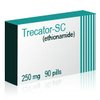Antibiotics
- Main Info
- Amoxil
- Ampicillin
- Augmentin
- Bactrim
- Biaxin
- Brand Amoxil
- Cefadroxil
- Cefixime
- Ceftin
- Cephalexin
- Chloramphenicol
- Chloromycetin
- Ciplox
- Cipro
- Cleocin
- Doxycycline
- Erythromycin
- Ethionamide
- Flagyl ER
- Floxin
- Fucidin
- Keflex
- Keftab
- Lincocin
- Minocin
- Minocycline
- Minomycin
- Myambutol
- Noroxin
- Nitrofurantoin
- Omnicef
- Roxithromycin
- Sumycin
- Suprax
- Stromectol
- Terramycin
- Tetracycline
- Tinidazole
- Trimox
- Vantin
- Zithromax
- Zyvox
- Diseases and antibiotics
- Treating with antibiotics

Basic Information about Antibiotics
They are quite powerful medications that are taken by many patients to treat bacterial infections. It’s necessary to use them correctly to save lives because they either keep bacteria from reproducing or kill them. For example, antibiotics can fight the infections caused by such viruses as flu, cold, bronchitis, cough, sore throat and so on. If any virus keeps making you sick, you need to take this medicine, but you shouldn’t use it when it’s not needed or take it improperly because you will do more harm than good.
Take into consideration antibiotic resistance that happens when specific bacteria change and can resist the effects of antibiotics. Make sure that you follow the necessary directions quite carefully when undergoing this type of treatment. You need to finish it even if you feel very well because if you stop this treatment too early, some bacteria may survive in the body and start re-infecting you. It’s not allowed to save antibiotics for the future or use prescriptions of other patients.

Description
Ethionamide is used to treat the tuberculosis infection in combination with other medicines. It can also be used to treat other problems or infections other than the defined problems. The doctors can use the medicine in combinations to provide better and healthy options of the treatments. Ethionamide is an antibacterial agent that simply stops the growth of TB cells and causes them to death.
Dose
The dose of Ethionamide can be defined by a doctor after studying the medical history of the patient according to age, weight, and other factors. It is important that a patient should be treated in a personalized way with Ethionamide. If the medicine is used as a generalized product it can cause trouble for the people because of every person is different from the other. Therefore, it is important that to get your prescription you should provide all your medical history to your doctor and discuss your present medications.
Direction for use
While using the Ethionamide you need to take care of the following things:
- Do not skip your medicine, if you have skipped the one then take the next one on time and do not double the dose to complete the count for the day.
- Make sure to have the accurate amount of medicine in the suggested form.
- If you are taking the liquid suspension of Ethionamide then make, sure you have measuring cup to get the accurate measurement. Do not use the kitchen spoon for measurement.
- Do not terminate or extend your treatment without consulting your doctor.
- If you are not feeling any kind of progress in your condition do let your doctor know about it.
- Make sure to complete the treatment at once immediately and do not extend the use of Ethionamide as it can cause a second infection.
Side effects
Like all the other antibiotics is does have mild diarrhea, vomiting, and nausea as the normal or general side effects. Major users of Ethionamide face these mild side effects of the medicine. However, apart from these are some severe side effects that really troubles you and you need it seeks the immediate medical attention. However, these are rare effects that are recorded in very few of the Ethionamide users.
- Bloody or watery diarrhea
- Difficult or painful urination
- Allergic reactions, rashes, hives, difficulty in breathing, swelling of mouth, lips, tongue, face
- Tightness in chest and increased heart rate
- A headache, chills, sweating, tremor
- Easy bruising or bleeding
- Yellowing of eyes or skin
- Nervousness, tingling, numbness, weakness, dizziness fainting
- Change in vision or loss o vision
Special recommendations
- Alcohol, hot weather, exercise, and fever can increase the effects of fainting and lightheadedness
- When using the Ethionamide, it is recommended to avoid the use of alcohol and tobacco
- Ethionamide enhances the sensitivity to sun, so avoid the direct exposure to the sunlight
- It is effective only against the bacteria and is not recommended to use against the viral infections.
- The infection condition of every person is different so it is recommended to use the Ethionamide with personalized prescriptions.



